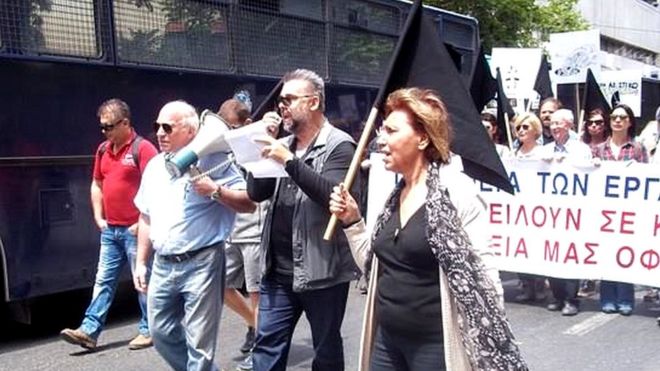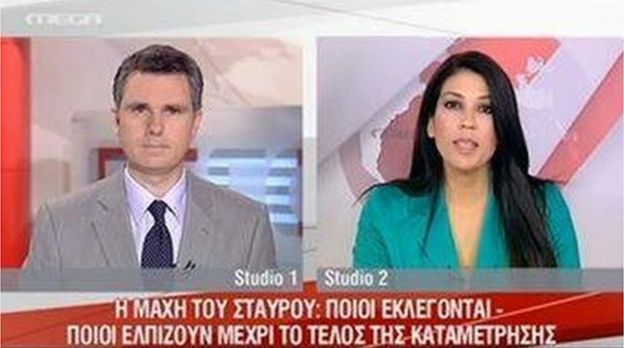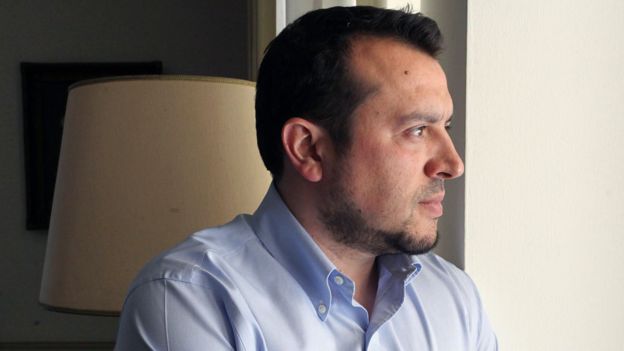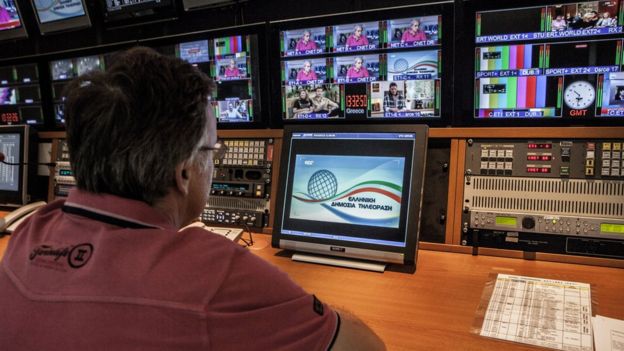- 1 hour ago
- Europe

It has been a nerve-wracking week for staff at Greece's oldest private TV channel, Mega.
On Tuesday, after going for two months without pay, staff were told the channel's owner could go bankrupt, shutting down the operation for good.
But at the eleventh hour, shareholders agreed to prop up the company. So for now, at least, the 500 staff are breathing a sigh of relief.
Burdened by bank loans estimated at €116m ($129m; £88m), the channel's future has been unclear for a long time.
Since the financial crisis hit Greece in 2010, many media operations have had to shut down. One of the most memorable was Alter TV, whose owner was charged with tax evasion and imprisoned, and 700 staff suddenly lost their jobs.
Six years on, the country is still suffering. Its economy has shrunk by a quarter and the unemployment rate is the highest in the EU at 24%.
A slump in advertising has made it harder for media outlets to survive.
The turnover of Greek advertising firms fell from €1bn in 2007 to just €250m in 2014. And the turnover of the surviving private TV channels halved over the same period.
 MEGA TV
MEGA TV
There is now added pressure from the government, led by the left-wing Syriza Party. It is demanding that, for the first time, Greek channels pay for licences.
The government has also decided to offer only four licences for terrestrial TV channels broadcasting general, free-to-air content. Seven such channels exist, so some will inevitably have to close.
The minister of state responsible for the new measures, Nikos Pappas, says that in the long run such a limit on licences is the only financially-viable option.
"How can the market, as it is, sustain so many channels?" he says to the BBC. "We cannot have so many unsustainable media outlets running and building up debt."
He has launched an international tender for the 10-year licences, with opening bids starting at €3m.
Companies bidding must give proof of earnings, be completely transparent in terms of assets and prove they pay their staff.

Mr Pappas argues that transparency is key and that the time has come to break the "triangle" of corruption, which he says exists between politics, banks and the media.
"For years, many of our channels have been sustained by their businessmen owners and the profits they make from state contracts or other ventures," he says. "They used their money to prop up channels that were not economically sustainable.
"At the same time politicians were happy to do business with these channel owners, because it meant they were never criticised by them. On the contrary, they were portrayed favourably. It is scandalous."
The owner of the Greek channel Skai, Yiannis Alafouzos, agrees that the "triangle" must stop. But he argues that in a free market it is not the government's job to decide how many channels there should be and which should survive or fail.
"A lot of media companies were PR departments for businesses, that's true," he says.
"But the government keeps using this set-up as an excuse. If a company goes bankrupt - let it. If an owner has been found to be acting improperly or illegally, he should be held to account and face charges.
"What they're doing is creating a closed profession."

Greek TV owners
ΑNT1 - Minos Kyriakou, Greek ship owner with great interest in media. Major shareholder of Ant1 Group (TV) and Dafni Communications (print). Owner of the Panhellenic Sports Association. Headed Greek Olympic Committee (2004-2009).
Skai -Yiannis Alafouzos, Greek businessman, owner of Skai Group and president of Panathinaikos football team. Group owns Skai TV station, Skai radio, newspaper Kathimerini and other minor radio stations and publications.
Alpha TV -Dimitris Kontominas, Greek businessman involved in insurance, media, banking. He owns Alpha TV, regional Channel 9 and Alpha 98.9 radio channel. From 1998-2001 he owned the football team Aris of Thessaloniki. His biggest company is Interamerican Insurance.
Mega TV - Three major shareholders: Stavros Psiharis (journalist and businessman), Fotis Bobolas, son of Giorgos Bobolas, who is a construction and media tycoon, and Vardis Vardinogiannis, an oil and shipping tycoon. His Vardinogiannis group also owns Star TV.
E channel - Filippos Vrionis, businessman, major shareholder of TV channels Ε, regional Εxtra 3 and Zoom TV.

The government says the number of licences allowed was calculated by the European University Institute in Florence. The international tender was also a commitment made under the third EU bailout for Greece, signed by Prime Minister Alexis Tsipras in 2015.
 AFP
AFP
In recent years, many independent media sites have been set up in Greece, such as ThePressProject or Unfollow, by those keen to loosen ties between channel owners and politicians. Many of them are self-funded and most are web-based.
The most recent, AthensLive, is a crowdfunded project that aims to tell the true, unbiased story of what is happening in Greece.
Tassos Morfis, a key player in AthensLive, said 60% of Greeks had voted against the last bailout deal, "but the mainstream media largely supported the Yes campaign".
He adds: "The channels try to influence people and we are sick of it. Most of my friends don't even watch TV anymore. What's the point? Nothing is accurate."
TV channel owners argue the opposite, saying media freedom and pluralism are being threatened. Their union says it will do all it can to prevent the government from putting the broadcasting reforms into practice and has complained to the Council of Europe, a leading human rights watchdog.
The government, however, has set a July deadline for channels to apply for the new licences.

No comments:
Post a Comment